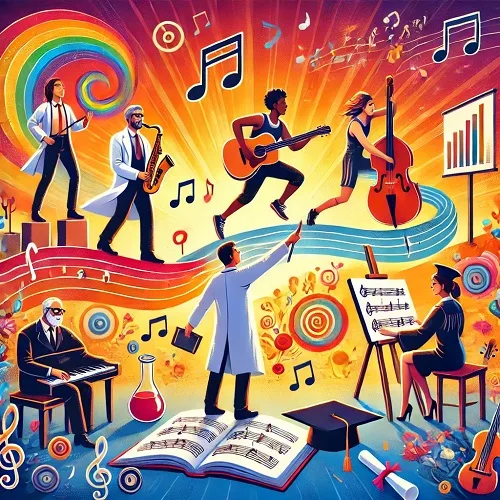How Music Motivates People to Achieve Great Things

Music has always played a pivotal role in human culture and society, serving as a source of inspiration and motivation. This article explores how music can drive individuals to achieve remarkable feats, enhance their productivity, and foster a sense of determination and resilience.
The Psychological Impact of Music
Music’s profound effect on the human psyche is well-documented. It can elevate mood, reduce stress, and even alter our perception of time. The psychological benefits of music can enhance our mental state, making us more focused and driven. Research shows that listening to uplifting music can trigger the release of dopamine, a neurotransmitter associated with pleasure and reward, which in turn motivates us to pursue our goals with greater enthusiasm.
Furthermore, music can create a sense of emotional connection and empathy, which can be particularly motivating in collaborative settings. When team members feel emotionally aligned through shared musical experiences, they are more likely to work cohesively towards common objectives, resulting in enhanced productivity and achievement.
Music as a Tool for Enhancing Performance
Athletes and performers often use music to enhance their performance. The right playlist can provide the perfect backdrop for training sessions, helping individuals maintain their energy and focus. Studies have shown that listening to fast-paced, rhythmic music can improve physical performance by increasing endurance and reducing perceived effort.
In addition to physical performance, music can also boost cognitive functions. Students and professionals alike find that background music can aid concentration and memory retention. By creating an optimal auditory environment, music helps individuals perform complex tasks more efficiently, leading to greater achievements in academic and professional realms.
Music as a Source of Inspiration
Many people turn to music for inspiration, whether they are artists, writers, or entrepreneurs. Music can spark creativity and provide the mental clarity needed to develop innovative ideas. Listening to different genres and styles can expose individuals to new perspectives, stimulating their imagination and encouraging out-of-the-box thinking.
Moreover, music often carries powerful messages that resonate deeply with listeners. Lyrics that speak to personal struggles, triumphs, and aspirations can serve as a source of motivation, reminding individuals of their potential and the importance of perseverance.
For instance, many entrepreneurs find that music with empowering themes helps them stay motivated during challenging times. The emotional boost provided by motivational songs can be just what is needed to overcome obstacles and push towards success.
Music and Emotional Resilience
Emotional resilience is crucial for achieving long-term goals, and music can play a significant role in building this resilience. During difficult times, music offers comfort and solace, helping individuals process their emotions and regain their strength.
Listening to music that reflects one’s emotional state can be a therapeutic experience. It allows individuals to confront and understand their feelings, which is essential for emotional growth and resilience. Over time, this emotional fortitude translates into a stronger ability to face and overcome challenges, paving the way for greater accomplishments.
Additionally, music can serve as a reminder of past successes and the resilience that got us through previous hardships. This can be particularly motivating when faced with new challenges, as it reinforces the belief that perseverance will lead to eventual success.
Thus, by fostering emotional resilience, music helps individuals maintain their motivation and dedication, even in the face of adversity.
Music in the Workplace
Incorporating music into the workplace can significantly boost employee motivation and productivity. Background music in office environments has been shown to improve mood, increase efficiency, and reduce stress levels among employees.
For creative tasks, music with a moderate tempo and volume can enhance cognitive performance and stimulate innovative thinking. On the other hand, repetitive tasks may benefit from high-energy music that keeps employees alert and engaged.
Moreover, shared musical experiences, such as team-building activities involving music, can strengthen team cohesion and morale. This improved teamwork and communication can lead to higher overall productivity and a more motivated workforce.

Personal Stories of Music-Induced Achievement
Numerous individuals have attributed their achievements to the motivational power of music. For instance, world-renowned athletes often credit their pre-game playlists for getting them into the right mindset to perform at their best. Similarly, successful entrepreneurs frequently mention how certain songs have helped them maintain their focus and drive during the arduous journey of building their businesses.
These personal stories highlight the universal impact of music on motivation. Whether it’s overcoming personal challenges, reaching professional milestones, or achieving athletic excellence, music serves as a constant source of inspiration and drive for many.
In conclusion, music’s ability to motivate people to achieve great things is undeniable. Its influence spans psychological, emotional, and cognitive realms, providing the impetus needed to pursue and attain remarkable goals. By integrating music into our daily lives, we can harness its motivational power to propel us towards success.
